Book contents
- Frontmatter
- Contents
- Preface
- 1 An Introduction
- PART I CREATING SOCIAL CAPITAL
- PART II AN EMPIRICAL EXAMINATION OF THE ARGUMENT
- PART III MAKING DEMOCRACY WORK WITHOUT SOCIAL CAPITAL: INSTITUTIONAL CAPITAL
- 7 If You Build It They Will Come: Institutional Capital in Democratic Development
- 8 Conclusion
- Appendix
- Works Cited
- Index
7 - If You Build It They Will Come: Institutional Capital in Democratic Development
Published online by Cambridge University Press: 05 June 2012
- Frontmatter
- Contents
- Preface
- 1 An Introduction
- PART I CREATING SOCIAL CAPITAL
- PART II AN EMPIRICAL EXAMINATION OF THE ARGUMENT
- PART III MAKING DEMOCRACY WORK WITHOUT SOCIAL CAPITAL: INSTITUTIONAL CAPITAL
- 7 If You Build It They Will Come: Institutional Capital in Democratic Development
- 8 Conclusion
- Appendix
- Works Cited
- Index
Summary
Le Congrés ne marche pas; il danse.
La Garde-ChambonasWhen, in The Social Contract, Rousseau confronted the possibility that the people, while willing the good, might not always be able to see the good, he reached back to ancient Greek and Roman traditions and suggested the Legislator, the extraordinary individual with sufficient wisdom to establish a system of laws and institutions that would enable a society to manage its affairs in peace and justice.
Thornton H. AndersonIt was a balmy South American spring night in early November. The clock read 1 a.m. in Buenos Aires, a city that never sleeps. I had been observing the debate on the floor of the Senate since 5 p.m. the previous evening, and I could not keep my eyes open any longer. As I left the National Congress, I paused for a moment on the sidewalk and looked back. On both sides of the four-story Congress, lights blazed in every window, visual testimony to the vitality, energy, and power of Argentina's contemporary Congress. On the right side of the imposing, Baroque-style building beneath its bronze dome, just outside the House of Deputies, dozens of advisors, staff people, and secretaries scurried back and forth across the now-empty street between the Congress and the House Office Building. An important vote was coming down in the lower chamber, and Deputies were demanding information from their exhausted staff as debate swelled on the floor. But that vote would not come for another several hours and I, for one, had had it.
- Type
- Chapter
- Information
- Social Capital in Developing DemocraciesNicaragua and Argentina Compared, pp. 201 - 237Publisher: Cambridge University PressPrint publication year: 2010



